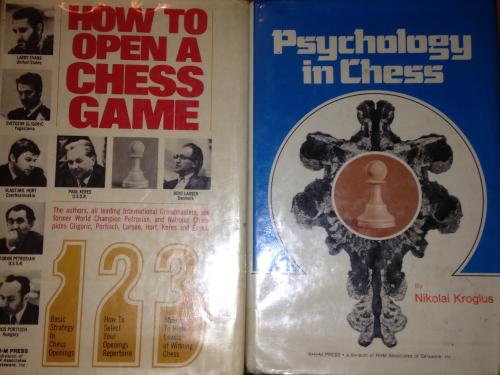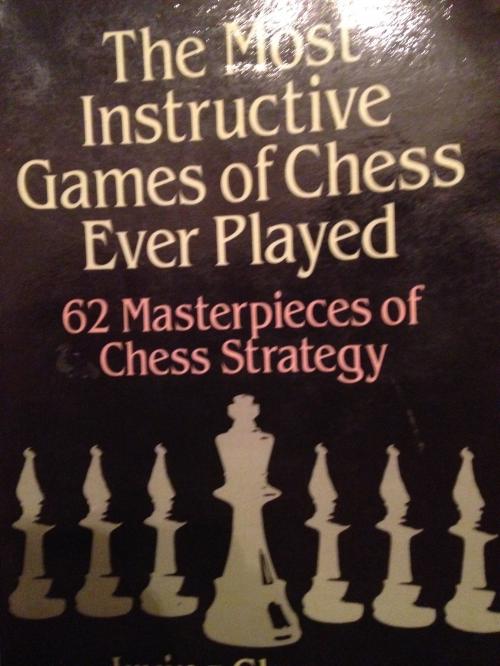I have a dilemma. You see (and you surely do, because a picture is below) that I have taken out two books from the library.

I forgot about reading them, which I was planning to do. I have recently learned, however, that they are overdue. The choice is: do I give them back immediately and apologize, or do I keep them long enough to read? The second is a viable option, as they have not threatened me with any fines as of yet. Additionally, they are checked out very rarely. I will likely not keep the books from anyone who wants them by delaying: How to Open a Chess Game and Psychology in Chess were checked out last in 2010 and 2011 (or at least this is the most accurate I can get by studying the checkout slips in the back of the books.) Any input on this matter?
Another book I have in my possession (given to me as a Christmas present a few years ago) is this book:

I have only finished it last week, and it is brilliant. It is in descriptive notation, but that should not deter anyone. Chernev annotates beautifully, with simple, clear, and often humorous asides and variations. Even better is his choice of games: he, as well as a few more well-known games, brings others that I for one, would have never seen to the table. Despite their relative infamy, they are beautiful, and Chernev’s annotations only heighten the learning potential of this book. In short, readers of the wondrous site Red Hot Pawn, I recommend it.
One thing that is great about the book, especially compared to some others, is that it has mostly brilliant endgames, which are usually neglected by other authors for being boring. And it is true, I enjoy tactical games, which is why I try to feature them in my blog, but I have a few endgames to show here: a brilliant study is below, which I found excruciatingly entertaining.
http://akobiachess.gol.ge/Studies4/100.htm
Stalemates are always good to look for, right? Not in the below game–where a bad bishop is cleverly outplayed by a knight–beware, it is long. Skip to move ~69 for the awesome endgame. I will pass on annotating up until then, partly to make it easier to find, partly because it is a very, very long game, and the endgame is the most instructive part. However, I’ll leave the rest, if you’d like to see the build-up play.
Clapping ensues. What a masterpiece!
______________________________________________________________________________
In other news, the British Knockout is just finishing up, with the finals between David Howell and Nicholas Pert. This was a (similar to: five games, not four) world-cup style knockout between eight strong British players: IM Yang Fan Zhou, GM David Howell, GM Jonathan Rowson, GM Jonathan Hawkins, GM Luke McShane, GM Nicholas Pert, and IM Daniel Howard Fernandez. Michael Adams, unfortunately, was absent, as he was playing across the city in the London Chess Classic. (Also unfortunately, the games so far from that haven’t been too interesting, but we’ll wait for more inspiring chess in future rounds.)
The quarterfinal between Jonathan Hawkins and Nicholas Pert was interesting, producing two games I deemed worthy of examination. This was the second game in their five-game matchup. The score, as of this game’s beginning, was ½-½: Pert had only managed a draw as White.
After this game, Hawkins won, and Pert produced a wild, freewheeling game, tying up the match and going on to win it and advance to the semifinals.
Howell won the first game with an interesting approach in his semifinal against Gawain Jones.
Lastly, I recommend, though there isn’t room to include it here, as it’s already running a bit long, digging up the games from the Nicholas Pert–Luke McShane match in the semifinals. Here is the first game: https://chess24.com/en/watch/live-tournaments/british-knockout-2015/2/2/1
Play good chess!
–HikaruShindo

I forgot about reading them, which I was planning to do. I have recently learned, however, that they are overdue. The choice is: do I give them back immediately and apologize, or do I keep them long enough to read? The second is a viable option, as they have not threatened me with any fines as of yet. Additionally, they are checked out very rarely. I will likely not keep the books from anyone who wants them by delaying: How to Open a Chess Game and Psychology in Chess were checked out last in 2010 and 2011 (or at least this is the most accurate I can get by studying the checkout slips in the back of the books.) Any input on this matter?
Another book I have in my possession (given to me as a Christmas present a few years ago) is this book:

I have only finished it last week, and it is brilliant. It is in descriptive notation, but that should not deter anyone. Chernev annotates beautifully, with simple, clear, and often humorous asides and variations. Even better is his choice of games: he, as well as a few more well-known games, brings others that I for one, would have never seen to the table. Despite their relative infamy, they are beautiful, and Chernev’s annotations only heighten the learning potential of this book. In short, readers of the wondrous site Red Hot Pawn, I recommend it.
One thing that is great about the book, especially compared to some others, is that it has mostly brilliant endgames, which are usually neglected by other authors for being boring. And it is true, I enjoy tactical games, which is why I try to feature them in my blog, but I have a few endgames to show here: a brilliant study is below, which I found excruciatingly entertaining.
http://akobiachess.gol.ge/Studies4/100.htm
Stalemates are always good to look for, right? Not in the below game–where a bad bishop is cleverly outplayed by a knight–beware, it is long. Skip to move ~69 for the awesome endgame. I will pass on annotating up until then, partly to make it easier to find, partly because it is a very, very long game, and the endgame is the most instructive part. However, I’ll leave the rest, if you’d like to see the build-up play.
Eugenio Torre–Ole Jakobsen Amsterdam 1973
Clapping ensues. What a masterpiece!
______________________________________________________________________________
In other news, the British Knockout is just finishing up, with the finals between David Howell and Nicholas Pert. This was a (similar to: five games, not four) world-cup style knockout between eight strong British players: IM Yang Fan Zhou, GM David Howell, GM Jonathan Rowson, GM Jonathan Hawkins, GM Luke McShane, GM Nicholas Pert, and IM Daniel Howard Fernandez. Michael Adams, unfortunately, was absent, as he was playing across the city in the London Chess Classic. (Also unfortunately, the games so far from that haven’t been too interesting, but we’ll wait for more inspiring chess in future rounds.)
The quarterfinal between Jonathan Hawkins and Nicholas Pert was interesting, producing two games I deemed worthy of examination. This was the second game in their five-game matchup. The score, as of this game’s beginning, was ½-½: Pert had only managed a draw as White.
Jonathan Hawkins–Nicholas Pert, British Knockout 2015
After this game, Hawkins won, and Pert produced a wild, freewheeling game, tying up the match and going on to win it and advance to the semifinals.
Jonathan Hawkins–Nicholas Pert, British Knockout 2015
Howell won the first game with an interesting approach in his semifinal against Gawain Jones.
David Howell–Gawain Jones, British Knockout 2015
Lastly, I recommend, though there isn’t room to include it here, as it’s already running a bit long, digging up the games from the Nicholas Pert–Luke McShane match in the semifinals. Here is the first game: https://chess24.com/en/watch/live-tournaments/british-knockout-2015/2/2/1
Play good chess!
–HikaruShindo

